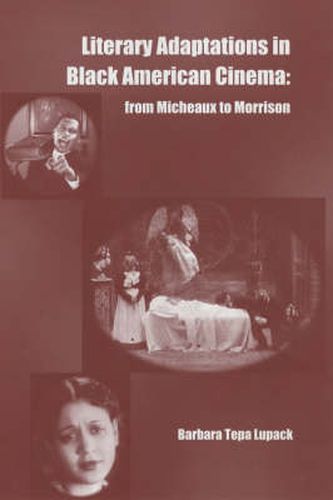Readings Newsletter
Become a Readings Member to make your shopping experience even easier.
Sign in or sign up for free!
You’re not far away from qualifying for FREE standard shipping within Australia
You’ve qualified for FREE standard shipping within Australia
The cart is loading…






‘A fascinating comprehensive journey…thoroughly recommended.’ BLACK FILMMAKER. The cinematic representation of blacks, especially in silent and early film, was shaped not only by the sentimental racism of the culture but also by the popular literature which distorted black experience and restricted black characters to minor, stereotyped roles. By contrast, in the works of black writers from Oscar Micheaux to Toni Morrison, the black experience has been more fully, more accurately, and usually more sympathetically realized; and from the early days of film, select filmmakers have looked to that literature as the basis for their productions. An historical examination of the practice of such adaptation offers telling insights into the portrayal - and progress - of blacks in American movies and culture. It reveals that while blacks, on screen and behind the scenes, were often forced to re-create the demeaning film stereotypes, they learned how to subvert and exploit the artificiality of their caricatures. It also reveals the ways that black filmmakers, beginning with Micheaux, Noble and George Johnson, and their less prominent colleagues like Emmett Scott, worked within the conventions of cinema and society, yet managed to produce films that were, at their best, unconventional and pioneering. It demonstrates that as far back as the 1920s and 1930s, black authors like Paul Laurence Dunbar and Langston Hughes already recognized the need for involvement with film production in order to create pictures that were more representative of black life. It illustrates the fact that, in recent years, as more black voices found their way to the screen, among the strongest were the voices of women. And above all, it confirms that within the rich tradition of black literature of all genres lie many exciting cinematic possibilities for audiences of all colors. Barbara Tepa Lupack has written extensively on the topic of literary adaptations in cinema and is co-author (with Alan Lupack) of King Arthur in America.
$9.00 standard shipping within Australia
FREE standard shipping within Australia for orders over $100.00
Express & International shipping calculated at checkout
‘A fascinating comprehensive journey…thoroughly recommended.’ BLACK FILMMAKER. The cinematic representation of blacks, especially in silent and early film, was shaped not only by the sentimental racism of the culture but also by the popular literature which distorted black experience and restricted black characters to minor, stereotyped roles. By contrast, in the works of black writers from Oscar Micheaux to Toni Morrison, the black experience has been more fully, more accurately, and usually more sympathetically realized; and from the early days of film, select filmmakers have looked to that literature as the basis for their productions. An historical examination of the practice of such adaptation offers telling insights into the portrayal - and progress - of blacks in American movies and culture. It reveals that while blacks, on screen and behind the scenes, were often forced to re-create the demeaning film stereotypes, they learned how to subvert and exploit the artificiality of their caricatures. It also reveals the ways that black filmmakers, beginning with Micheaux, Noble and George Johnson, and their less prominent colleagues like Emmett Scott, worked within the conventions of cinema and society, yet managed to produce films that were, at their best, unconventional and pioneering. It demonstrates that as far back as the 1920s and 1930s, black authors like Paul Laurence Dunbar and Langston Hughes already recognized the need for involvement with film production in order to create pictures that were more representative of black life. It illustrates the fact that, in recent years, as more black voices found their way to the screen, among the strongest were the voices of women. And above all, it confirms that within the rich tradition of black literature of all genres lie many exciting cinematic possibilities for audiences of all colors. Barbara Tepa Lupack has written extensively on the topic of literary adaptations in cinema and is co-author (with Alan Lupack) of King Arthur in America.